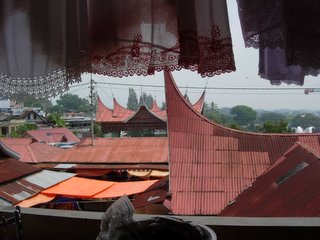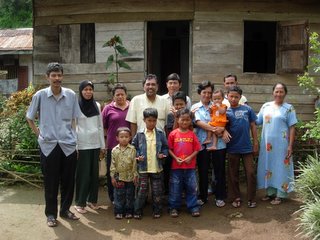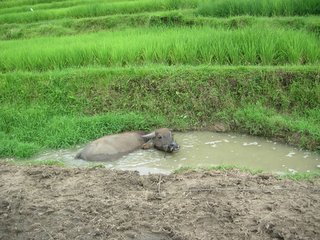 And a lot did happen. I went with my American friend and her two children to her amazingly beautiful house in Sanur,
And a lot did happen. I went with my American friend and her two children to her amazingly beautiful house in Sanur,  her husband from
her husband from  hange, I taught several children, theirs included, how to sing “head, shoulders, knees and toes” and then explained (in Indonesian, which they understood even with my limited language ability) about how many people in the world don’t like other people because they have different noses or eyes or knees or skin color, but that Baha’u’llah – the founder of the Baha’i Faith – teaches that these differences should not be a problem. That our hearts are all the same and that we should all be like one family. Outside was a beautiful flower garden full of pink and yellow crysanthemums. People in Java don’t only have flower gardens if they are wealthy enough to pay someone to garden for them.
hange, I taught several children, theirs included, how to sing “head, shoulders, knees and toes” and then explained (in Indonesian, which they understood even with my limited language ability) about how many people in the world don’t like other people because they have different noses or eyes or knees or skin color, but that Baha’u’llah – the founder of the Baha’i Faith – teaches that these differences should not be a problem. That our hearts are all the same and that we should all be like one family. Outside was a beautiful flower garden full of pink and yellow crysanthemums. People in Java don’t only have flower gardens if they are wealthy enough to pay someone to garden for them.At the end of the week I spent the weekend in Padang (Padang is where the ferry leaves to the Mentawai islands which takes about 10 hours – of note to anyone who has read Dr. Muhajir). The first day I went with a girl to visit her Buddhist friend. Then we went to the family noodle factory. It was an experience. There were trays of what looked like screen doors with piles of bright yellow noodles drying in the sun. There were teenagers packing the noodles into bags outside under a covered area (no gloves, no hairnets, dirt floor), and inside were the mixing vats, nasty-looking steaming water, and piles of broken waste noodles. I turned down the offer to try some. We hurried to meet with some youth in the community and returned that evening to talk to the many visitors who had come to the house I was staying in. The next day we visited a Baha’is grave on a hill overlooking the sea and facing the Mentawai islands – really beautiful, then drove out to the beach. We visited a very old woman whose door opened onto the ocean. Her husband had made beautiful cross-stitch tapestries of scenes such as the Baha’i Holy site of Bahji. She fed us fried sweet potatoes and we proceeded to a tourist area on the beach with a legend about a man who left from that place to seek a fortune and forgot his mother, after which his ship sank and he was turned into stone on that very spot. It was a difficult drive with several children – seatbelts and carseats especially are unheard of – and I was glad to be going home the next day. Until the airline called and cheerfully told me that my flight had been cancelled. To make a long story short, I made it home in time to teach my Monday afternoon flute student, so it was just fine in the end.
